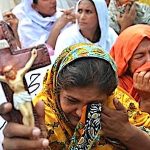By Foreign Policy –
Waiting for change in Afghanistan is like waiting for Godot.
Hatred is stalking the women of Afghanistan, pushing them further into darkness as world leaders appear to be ignoring the terrible truth that the Taliban’s efforts to disappear half the population are central to their hold on power. Taliban leaders say their misogynistic policies are steeped in religion, tradition, and respect for women. They tell Western officials that the prison-like restrictions will soon be eased, only then to tighten them further. For women who are isolated, brutalized, and desperate, Afghanistan has become that place where nobody can hear them scream.
The U.N.’s special rapporteur on Afghanistan, Richard Bennett, issued another devastating reporton Friday and again called on the Taliban to honor obligations to protect human rights, and for U.N. member states to ensure the “situation of human rights of women and girls in Afghanistan is central to all policy decisions and engagement” with the Taliban. Human rights organizations have reported extensively on Taliban atrocities, describing the anti-woman practices as “crimes against humanity,” “gender apartheid,” “a war on women,” and “femicide.”
Afghan women don’t use the jargon. They tell of gang rapes and being beaten on their breasts and genitals so they cannot display their injuries. They tell how their rapists urinated in their faces, and of much, much worse. They tell of relatives kidnapped into sex slavery to serve as Taliban “wives,” or murdered by the “vice and virtue police” for resisting, their bodies found by roadsides or hanging in trees. In interviews with Foreign Policy, women said that revealing their identities would be a death sentence.
Inequality and misogyny are hardly exclusive to Afghanistan, or to many fundamentalist religions more broadly, but the Taliban are plumbing depths few outside the country can comprehend. The question is why misogyny is so central to the Taliban worldview. The Taliban were already notoriously brutal toward women during their first rule, between 1996 and 2001. In their second incarnation, they’ve only gotten worse.
They seem to have deftly manipulated religious conservatism, which was consistent across most of Afghanistan’s ethnic and religious groups, into an elemental expression of what it means to be a “good” Muslim. The privations of war, beginning with the Soviet invasion in 1979, arguably led to the emasculation of Afghanistan’s men, who juxtaposed their masculinity against a weaker position for women. With the arrival in 2001 of the United States and billions of dollars in programs to educate and emancipate women, the notion of feminism could then be easily portrayed as another attack on the natural order of the country’s culture and religion, in which men were dominant.
Rights activists and academics said the Taliban have used their rhetorical and physical violence against women to secure support from conservative and religious communities. Those are mostly, though not exclusively, Sunni Pashtuns who predominate in southern Afghanistan and live according to a mythologized life code that extends warm hospitality, even to al Qaeda and other terrorists, and sequesters women from nearly all spheres of public life. The Taliban refined and intensified that ideology as they fought the so-called infidel U.S.-led forces and members of what they saw as a puppet government during their ultimately successful 20-year insurgency to win back control of the country.
“From 2001 to 2021, I think they evolved in a way that made their abusive views on women and girls even more central to their cause. So it makes sense that they won’t budge on those issues, after that ideology arguably led them to victory,” said Heather Barr, the associate women’s rights director at Human Rights Watch.
Part of the reason that misogyny became so central to the new Taliban was because of the way the group propagated itself, by brainwashing millions of boys in religious schools, or madrassas, in the mountainous border regions between Afghanistan and Pakistan. They were the Taliban’s future, then their cannon fodder, and now are their enforcers. The male-only madrassas that taught Taliban fighters Quran recitation and bomb-making—and where many were victims of sexual violence—also deprived them of family.
“They were always isolated from the other half of the population,” former Deputy Education Minister Marjan Mateen said. “If you have respectful relationships with the women in your family, you will have respect for women. The madrassa system deprived them of this.”
Keeping women uneducated was also a central plank of the Taliban’s construction of their new state, she said. The repression of women is “deeply rooted in traditional notions of patriarchy, but which they try to justify with recourse to Islam and culture,” she said, and an educated woman threatens that power base. “It is strategic to deprive women of education and agency, as this keeps the entire household ignorant,” she said.
Now back in charge, the Taliban cannot build an economy or create jobs. All they can offer to millions of young, uneducated, and unemployed men are women. “Being the king of their home and having total control of ‘their women’ may be all the power and recognition they get,” Barr said.
________________




